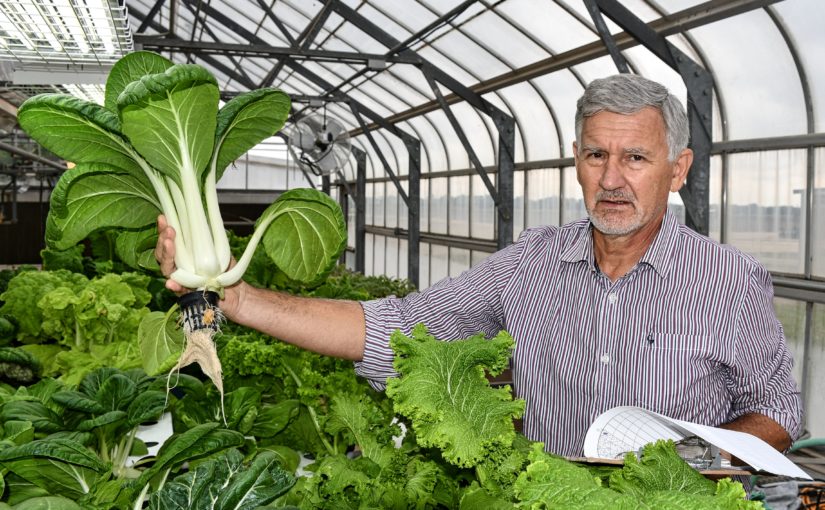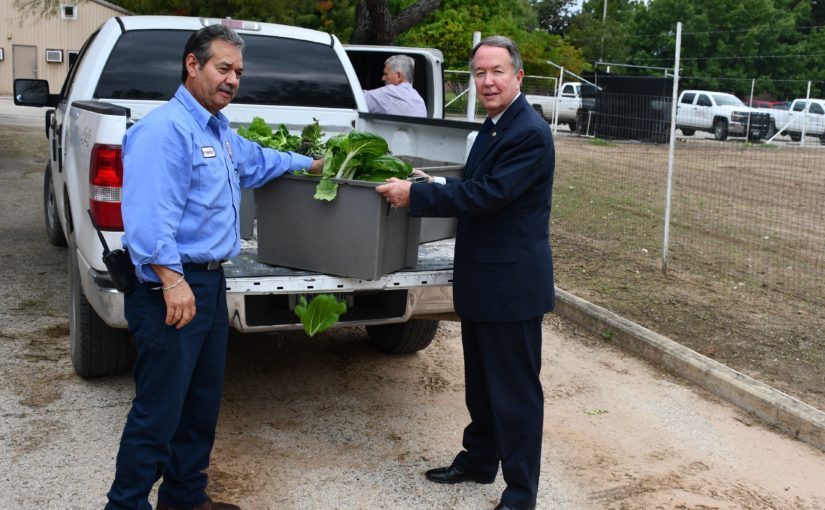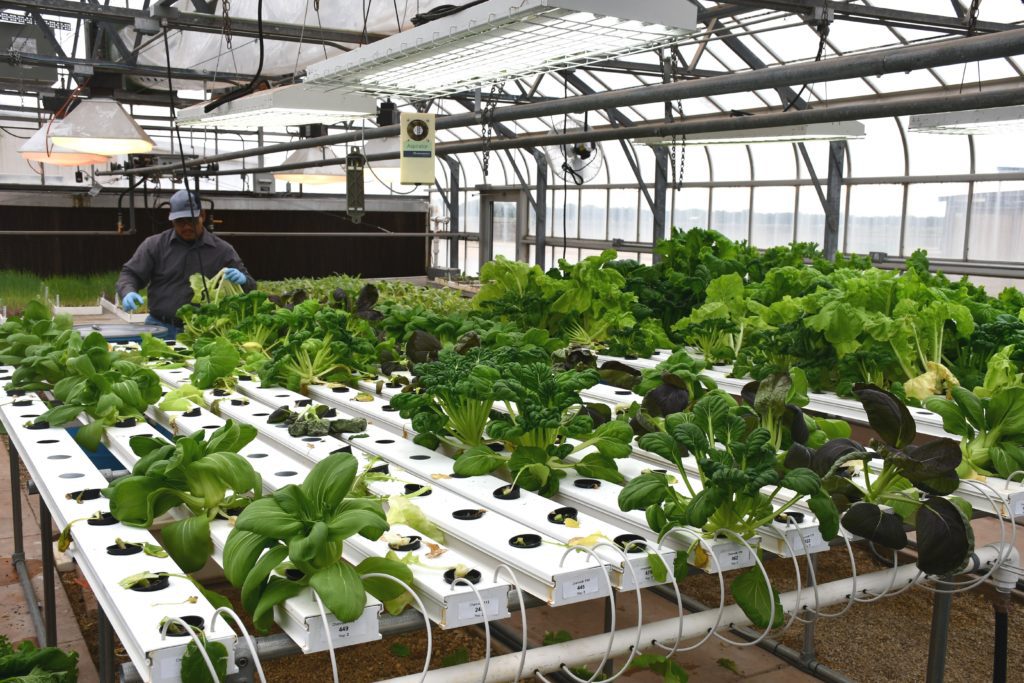Nov 5, 2018Uvalde AgriLife center donates hydroponic Asian vegetables
When researchers at the Texas A&M AgriLife Research and Extension Center in Uvalde completed recent yield and quality trials on hydroponically produced Asian leafy greens, they didn’t toss the surplus – they donated it to the Uvalde County Nutrition Center.
“Sharing our produce with the Uvalde County Nutrition Center has become a tradition with us,” said Daniel Leskovar, AgriLife center director. “We’ve been growing leafy greens hydroponically here at the center for research purposes over the past three years and didn’t want to waste perfectly good produce once we had obtained the data we needed. So, we contacted the nutrition center to see if they could use our surplus produce.”
Leskovar said the AgriLife center also provides other surplus produce, including tomatoes, peppers, onions and watermelons, to the Uvalde Food Pantry, which serves about 400 families countywide each day, as well as some residents of adjacent counties.
Uvalde County Judge William Mitchell and Tiffany Gonzalez, interim director of the nutrition center, were on hand to receive the most recent contribution of leafy greens, which this time had a distinctly Asian flair. The crops included different green and red varieties of bok choy, along with Chinese cabbage and baby mustard.
“We have about 150 seniors in Uvalde and another 150 seniors in Sabinal who we provide with a nutritious daily meal,” Gonzalez said. “We use the U.S. Department of Agriculture’s MyPlate nutritional guidelines for providing a meal that includes the needed vitamins and nutrients. These Asian leafy greens will help provide badly needed nutrition for seniors in Uvalde County.”


Mitchell said the contribution was just one of the many ways the AgriLife center helps the community.
“This is a great example of the way the AgriLife center has been benefiting the residents of Uvalde County ever since its establishment in 1972,” he said. “Ensuring the health and wellness of our residents is a shared goal of the county and the AgriLife center. We’re grateful for the AgriLife center for the many scientific and educational contributions, as well as this contribution of fresh produce we’re picking up today.”
Leskovar said previous produce contributions to the nutrition center had included domestically grown leafy greens such as spinach, kale, romaine, butterhead, loose leaf lettuce, cabbage and chard.
The surplus Asian vegetables were made available due to a recent research initiative funded by a Texas AgriLife Research Seed Grant, he explained. He said center personnel are studying the productivity and quality of Asian vegetables with cohorts in El Paso and Overton to help determine their viability as a specialty crop for Texas.
“This study complements previous research efforts at our center funded by a past Texas Department of Agriculture Specialty Crop Block Grant and being conducted in collaboration with the Uvalde County Underground Water Conservation District,” he said.
Leskovar noted field trials conducted in the ‘90s have shown Asian vegetables produce well in the southwestern region of Texas, particularly in the Winter Garden area.
“They are very high in nutritional content, and also have the potential for a long growing season in this region due to weather and soil conditions,” he said. “We feel they could be great specialty crops to diversify the offerings by Texas producers, especially to their urban consumers.”
Leskovar said he is encouraged by the productivity and quality shown by the 10 varieties of Asian vegetables grown hydroponically in the one of the center’s greenhouses.
“From a young seedling to harvest only took between 21-28 days, and growing them hydroponically in a protected environment significantly reduced chemical inputs while providing a highly nutritious, quality product in a relatively short time,” he said.
He said the Asian leafy greens tested low in calories and high in nutritional content, especially vitamins A, C and K, and are also loaded with antioxidants.
“Data indicates that 100 grams of bok choy can provide 31 percent, 60 percent and 50 percent of the recommended dietary allowance of vitamins A, C and K, respectively,forwomen in the 50-70 year-old bracket,” he said. “These are very healthful greens that provide many essential nutrients and are used widely in many eastern countries.”


Gonzalez said she was impressed to learn of the nutritional content of Asian leafy greens and looked forward to using them in recipes for the senior citizens served by the nutrition center.
“We tend to use more typical leafy greens in our recipes,” she said. “In fact, the AgriLife center provided us some romaine lettuce a few weeks ago and it was a hit with the seniors because most of them were only familiar with iceberg lettuce. We made Caesar salads for them using the romaine and they really enjoyed them.”
Gonzalez said she is now researching recipes in which the Asian vegetables might be used.
“This will be a little more of a challenge, but I’m looking forward to finding new recipes and seeing how these greens can be integrated into our meals,” she said. “I’m excited about having them and think the people we feed are going to like eating them.”
– Paul Schattenberg, Texas A&M AgriLife
Photo at top: Ten different varieties of red and green bok choy and other Asian leafy greens were grown hydroponically inside a greenhouse at the Texas A&M AgriLife Research and Extension Center in Uvalde. Photos: Paul Schattenberg/Texas A&M AgriLife Communications















